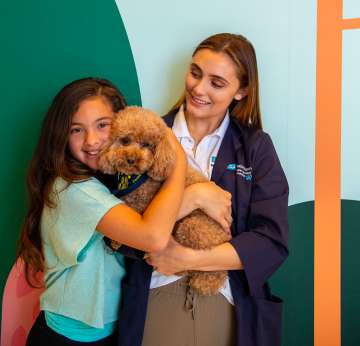People-Animal Connection
Animal-Assisted Therapy Research
Animal Assisted Therapy & What Science Says
For Mental Health
-
The simple act of petting animals releases an automatic relaxation response.

- Humans interacting with animals have found that petting the animal promoted the release of serotonin, prolactin and oxytocin- all hormones that can play a part in elevating moods.
- Lowers anxiety and helps people relax.
- Provides comfort.
- Reduces loneliness.
- Increases mental stimulation.
- Assist in recall of memories and help sequence temporal events in patients with head injuries or chronic diseases such as Alzheimer’s disease.
- Can provide an escape or happy distraction.
- Can act as catalysts in the therapy process.
- May help break the ice.
- May reduce the initial resistance that might accompany therapy.
For Physical Health
- Lowers blood pressure and improves cardiovascular health.
- Reduces the amount of medications some people need.
- Breathing slows in those who are anxious.
- Releases many hormones such as Phenylethylamine which has the same effect as chocolate.
- Diminishes overall physical pain.
- Relax more during exercise.
- Participants were motivated, enjoyed the therapy sessions more, and felt the atmosphere of the session was less stressful during Animal-Assisted therapy.
- For Children with Autism
- Many children with autism feel a deep bond with animals and feel that they are able to relate better than humans.
- Children with autism were engaged in significantly greater use of language as well as social interaction win their therapy sessions that incorporated animals compared to standard therapy sessions without them.